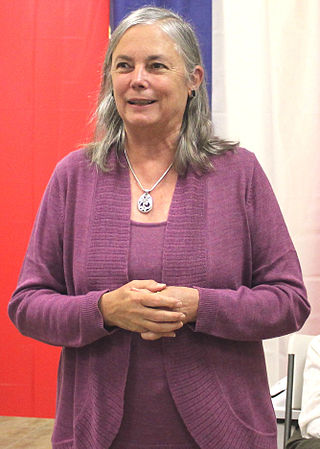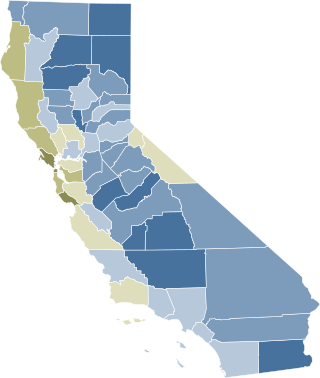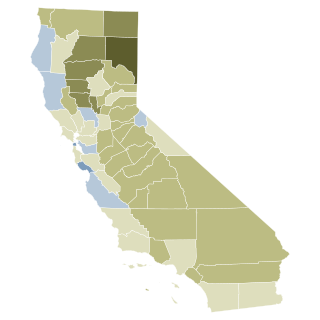
Valero Energy Corporation is an American-based downstream petroleum company mostly involved in manufacturing and marketing transportation fuels, other petrochemical products, and power. It is headquartered in San Antonio, Texas, United States. Throughout the United States and Canada, the company owns and operates 15 refineries, and one in Wales, with a combined throughput capacity of approximately 3 million barrels (480,000 m3) per day, 11 ethanol plants with a combined production capacity of 1.2 billion US gallons (4,500,000 m3) per year, and a 50-megawatt wind farm. A Fortune 500 company, before the 2013 spinoff of CST Brands, Valero was one of the United States' largest retail operators with approximately 6,800 retail and branded wholesale outlets in the United States, Canada, United Kingdom, Mexico and Peru under the Valero, Diamond Shamrock, Shamrock, Beacon, and Texaco brands.

Proposition 22 was a law enacted by California voters in March 2000 stating that marriage was between one man and one woman. In November 2008, Proposition 8 was also passed by voters, again only allowing marriage between one man and one woman.

Fabian Núñez is an American politician and labor union adviser. A member of the Democratic Party, he served three two-year terms as a member of the California State Assembly, leaving office in late 2008. During his last two terms, Núñez served as the 66th Speaker of the California State Assembly.
Same-sex marriage has been legal in California since June 28, 2013. The U.S. state first issued marriage licenses to same-sex couples on June 16, 2008 as a result of the Supreme Court of California finding in the case of In re Marriage Cases that barring same-sex couples from marriage violated the Constitution of California. The issuance of such licenses was halted from November 5, 2008 through June 27, 2013 due to the passage of Proposition 8—a state constitutional amendment barring same-sex marriages. The granting of same-sex marriages recommenced following the U.S. Supreme Court's decision in Hollingsworth v. Perry, which restored the effect of a federal district court ruling that overturned Proposition 8 as unconstitutional.

Proposition 74 (2005) was a ballot proposition in the 2005 California special election that intended to extend probationary periods for the state's public school teachers from two years to five before attaining tenure. It failed at the polls, with 55% of voters rejecting it.
The Global Warming Solutions Act of 2006, or Assembly Bill (AB) 32, is a California State Law that fights global warming by establishing a comprehensive program to reduce greenhouse gas emissions from all sources throughout the state. AB32 was co-authored by then-Assemblymember Fran Pavley and then-Speaker of the California Assembly Fabian Nunez and signed into law by Governor Arnold Schwarzenegger on September 27, 2006.

Frances J. "Fran" Pavley is an American politician who served two terms in the California State Senate and three terms in the California State Assembly. A Democrat, she last represented the 27th Senate District, which encompasses the Conejo Valley, and portions of the San Fernando and Santa Clarita Valleys. Due to term limits in California, Senator Pavley completed her legislative career in 2016. She is currently working as the Environmental Policy Director for the USC Schwarzenegger Institute.

Proposition 4, or the Abortion Waiting Period and Parental Notification Initiative, also known to its supporters as Sarah's Law, was an initiative state constitutional amendment in the 2008 California general election.

Proposition 8, known informally as Prop 8, was a California ballot proposition and a state constitutional amendment intended to ban same-sex marriage; it passed in the November 2008 California state elections and was later overturned in court. The proposition was created by opponents of same-sex marriage in advance of the California Supreme Court's May 2008 appeal ruling, In re Marriage Cases, which followed the short-lived 2004 same-sex weddings controversy and found the previous ban on same-sex marriage unconstitutional. Proposition 8 was ultimately ruled unconstitutional by a federal court in 2010, although the court decision did not go into effect until June 26, 2013, following the conclusion of proponents' appeals.

Proposition 2 was a California ballot proposition in that state's general election on November 4, 2008. It passed with 63% of the votes in favor and 37% against. Submitted to the Secretary of State as the Prevention of Farm Animal Cruelty Act, the initiative's name was amended to officially be known as the Standards for Confining Farm Animals initiative. The official title of the statute enacted by the proposition is the Prevention of Farm Animal Cruelty Act.

Proposition 11 of 2008 was a law enacted by California voters that placed the power to draw electoral boundaries for State Assembly and State Senate districts in a Citizens Redistricting Commission, as opposed to the State Legislature. To do this the Act amended both the Constitution of California and the Government Code. The law was proposed by means of the initiative process and was put to voters as part of the November 4, 2008 state elections. In 2010, voters passed Proposition 20 which extended the Citizen Redistricting Commission's power to draw electoral boundaries to include U.S. House seats as well.

California Proposition 7, would have required California utilities to procure half of their power from renewable resources by 2025. In order to make that goal, levels of production of solar, wind and other renewable energy resources would more than quadruple from their current output of 10.9%. It would also require California utilities to increase their purchase of electricity generated from renewable resources by 2% annually to meet Renewable Portfolio Standard (RPS) requirements of 40% in 2020 and 50% in 2025. Current law AB32 requires an RPS of 20% by 2010.

Proposition 66 was a California ballot proposition on the November 2, 2004 ballot. It was a proposed amendment to the California three-strikes law. Prop 66 would have required the third felony charge against a suspect to be especially violent and/or serious crimes to mandate a 25-years-to-life sentence. It also would have changed the definition of some felonies. It was rejected by voters, with 52.7% voting against the proposition.
Consumer Watchdog is a non-profit, progressive organization which advocates for taxpayer and consumer interests, with a focus on insurance, health care, political reform, privacy and energy.

The California state elections, November 2010 were held on November 2, 2010.
The Sustainable Communities and Climate Protection Act of 2008, also known as Senate Bill 375 or SB 375, is a State of California law targeting greenhouse gas emissions from passenger vehicles. The Global Warming Solutions Act of 2006 sets goals for the reduction of statewide greenhouse gas emissions. Passenger vehicles are the single largest source of greenhouse gas emissions statewide, accounting for 30% of total emissions. SB 375 therefore provides key support to achieve the goals of AB 32.

California Proposition 19 was a ballot initiative on the November 2, 2010, statewide ballot. It was defeated, with 53.5% of California voters voting "No" and 46.5% voting "Yes." If passed, it would have legalized various marijuana-related activities, allowed local governments to regulate these activities, permitted local governments to impose and collect marijuana-related fees and taxes, and authorized various criminal and civil penalties. In March 2010, it qualified to be on the November statewide ballot. The proposition required a simple majority in order to pass, and would have taken effect the day after the election. Yes on 19 was the official advocacy group for the initiative and California Public Safety Institute: No On Proposition 19 was the official opposition group.

Proposition 39 is a ballot initiative in the state of California that modifies the way out-of-state corporations calculate their income tax burdens. The proposition was approved by voters in the November 6 general election, with 61.1% voting in favor of it.

Proposition 22 was a ballot initiative in California that became law after the November 2020 state election, passing with 59% of the vote and granting app-based transportation and delivery companies an exception to Assembly Bill 5 by classifying their drivers as "independent contractors", rather than "employees". The law exempts employers from providing the full suite of mandated employee benefits while instead giving drivers new protections:

Proposition 30 is a California ballot proposition that appeared in the general election on November 8, 2022. The measure was defeated. The initiative would have raised taxes on the wealthy to fund wildfire management and electric vehicle incentives and infrastructure.












